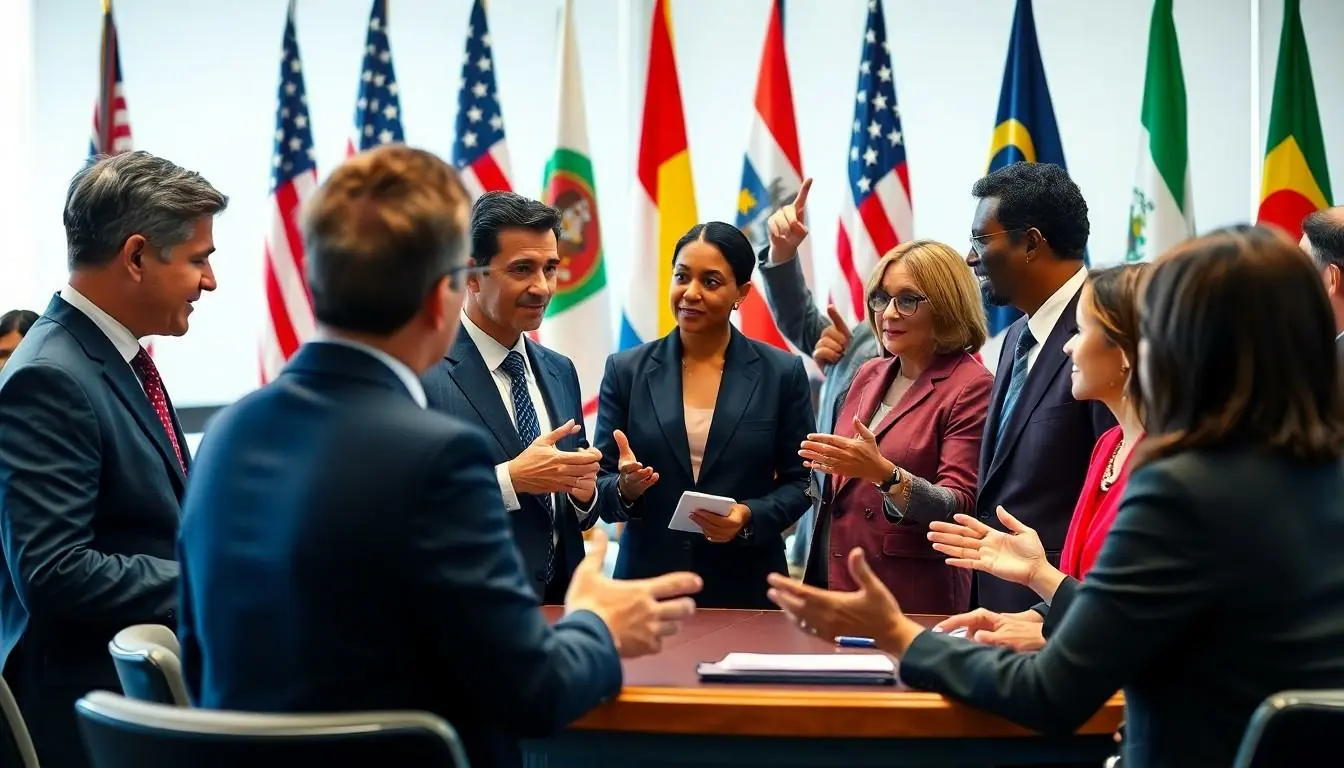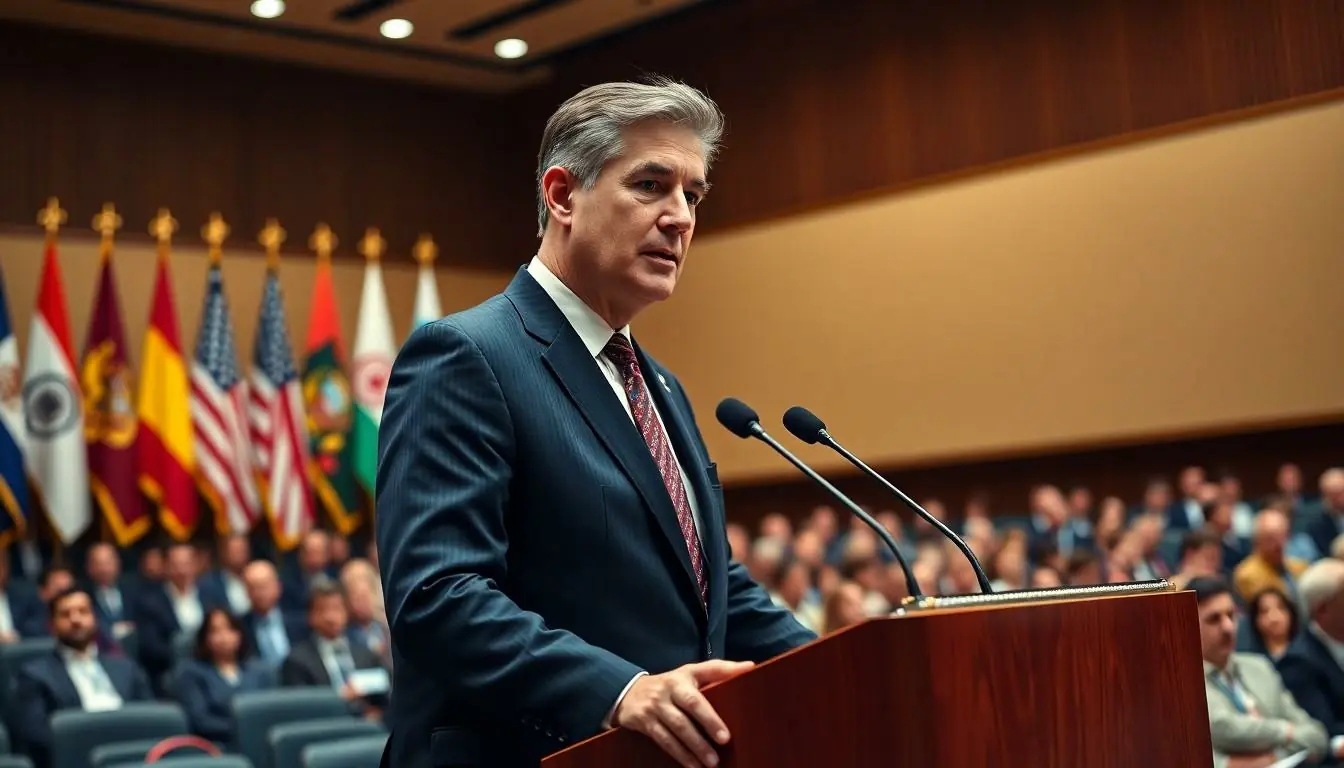Table of Contents
ToggleIn a world where borders are just lines on a map and diplomacy sometimes feels like a high-stakes game of chess, international relations and affairs shape our everyday lives more than one might think. Whether it’s trade agreements that keep our favorite snacks flowing or treaties that prevent global chaos, understanding the dynamics at play is crucial.
Imagine navigating a complex web of alliances, rivalries, and negotiations, all while trying not to spill your coffee. It’s a delicate dance of power, culture, and sometimes, sheer luck. As nations strive for influence and security, the stakes are high, and the outcomes can be downright unpredictable. Buckle up as we explore the fascinating world of international relations, where the only constant is change and the occasional diplomatic faux pas.
Overview of International Relations and Affairs
International relations and affairs encompass the interactions between nations, focusing on diplomacy, trade, and conflict resolution. These engagements shape the political and economic landscape of the world. Diplomacy involves negotiation and dialogue, fostering alliances while managing conflicts. Trade agreements play a crucial role in global economies, impacting the supply chain of essential goods.
International organizations, including the United Nations and NATO, facilitate cooperation on various issues. These entities promote peace, security, and economic development among member states. Additionally, treaties serve as formal agreements that regulate relationships, ensuring adherence to international laws.
Power dynamics significantly influence international relations. Countries wield different levels of influence, affecting alliances and rivalries. Understanding these dynamics requires an analysis of historical context and current geopolitical events. Cultural exchanges and public diplomacy also impact perceptions and relationships among nations.
Regional conflicts often arise due to territorial disputes, ethnic tensions, or resource competition. International response to such conflicts varies, often requiring mediation or interventions. Humanitarian issues frequently emerge alongside these conflicts, highlighting the need for cooperation in addressing global challenges.
Environmental concerns increasingly influence international affairs. Climate change impels nations to collaborate on sustainable practices and policies. Deforestation, pollution, and biodiversity loss require urgent action, making environmental diplomacy a priority on the global agenda.
International relations and affairs involve a complex web of interactions marked by cooperation and conflict. Recognizing the intricate balance between these dynamics is essential for navigating the global landscape effectively.
Key Theories in International Relations

Several key theories shape the understanding and practice of international relations. These frameworks offer valuable insights into how states interact within the global arena.
Realism
Realism emphasizes that states primarily act in their national interest, focusing on power and security. The theory suggests that international politics is governed by anarchy, where no central authority exists. In this environment, military strength remains crucial since threats abound. According to realists, cooperation can occur, yet it’s often temporary and based on self-interest. Renowned scholars like Hans Morgenthau have contributed significantly to this perspective, reinforcing its foundational principles.
Liberalism
Liberalism presents a contrasting view, highlighting the importance of cooperation and international institutions. This theory maintains that states can achieve mutual benefits through trade, diplomacy, and alliances. Institutions like the United Nations play a vital role in promoting peace and addressing global challenges, such as climate change. Liberals advocate for the idea that democracy and economic interdependence contribute to stable relations between countries. Key proponents like Robert Keohane and Joseph Nye support the notion that interconnectedness fosters cooperation above conflict.
Constructivism
Constructivism focuses on the social constructs that shape state behavior and international norms. This theory argues that ideas, identities, and beliefs significantly influence how states interact. Emphasizing the role of culture and historical context, constructivism posits that state actions arise from shared values and perceptions. Scholars such as Alexander Wendt highlight how collective identities can drive cooperation or conflict. Through this lens, understanding international relations hinges on recognizing the dynamic interactions of these social factors.
Major Players in International Affairs
International affairs involve various influential entities, including nation-states, international organizations, and non-governmental organizations. Each participant plays a pivotal role in shaping global policies and dynamics.
Nation-States
Nation-states serve as the primary actors in international relations. These sovereign entities conduct diplomacy, negotiate treaties, and engage in trade agreements. Examples like the United States and China illustrate how powerful states can influence global politics through economic strength and military capabilities. Cooperation among nation-states fosters strategic alliances while competition can lead to conflict. Understanding the goals and interests of each nation-state reveals motivations that shape international interactions.
International Organizations
International organizations facilitate collaboration between member states on global issues. The United Nations, for instance, promotes peace and security through its various agencies, addressing humanitarian crises and environmental challenges. These organizations create platforms for dialogue, helping to mediate disputes and encourage collective action. Additionally, regional entities like the European Union enhance economic cooperation among member countries, integrating economies and policies. Through multilateralism, international organizations work to achieve common objectives that often surpass individual national interests.
Non-Governmental Organizations
Non-governmental organizations play a crucial role in advocating for social change and humanitarian efforts across borders. Organizations like Amnesty International focus on human rights, while others, such as Greenpeace, address environmental issues. Influencing public opinion and policy, these NGOs mobilize resources and communities to tackle global challenges. Their work complements the efforts of both nation-states and international organizations, offering grassroots perspectives and solutions. Collaborating with various entities enhances their impact on international affairs, demonstrating the importance of diverse participation in the global arena.
Current Trends in International Relations
International relations continuously evolve, shaped by various trends that reflect global dynamics. Key areas include globalization, environmental concerns, and rising populism.
Globalization
Globalization transforms economic interactions and cultural exchanges between nations. It enhances trade by connecting markets, enabling economies to become interdependent. Nations benefit from shared technologies and ideas, which promote innovation and growth. Increased movement of people and goods influences cultural understanding and cooperation. As a result, challenges arise, such as protectionist policies that some countries implement to safeguard local industries.
Climate Change and Environmental Issues
Climate change presents urgent challenges that require global collaboration. Rising temperatures and extreme weather patterns affect nations across the world, demanding joint efforts for solutions. International agreements, like the Paris Agreement, aim to limit greenhouse gas emissions and promote sustainable practices. Environmental issues intersect with national security, as resource scarcity can lead to conflicts. Enhanced focus on renewable energy and sustainable development will shape future diplomatic negotiations.
Rise of Populism
Populism disrupts traditional political structures and influences international relations. In many countries, leaders adopt nationalist rhetoric, prioritizing domestic issues over global cooperation. Voter sentiments often shift towards preserving local jobs and industries, leading to skepticism about international agreements. This trend challenges established alliances and institutions, as populist movements can resist multilateral cooperation. As the global landscape changes, the balance between populism and international collaboration will test foreign policy frameworks.
Understanding international relations and affairs is essential in today’s interconnected world. The interplay of diplomacy trade and conflict resolution shapes not only political landscapes but also everyday lives. As nations navigate alliances and rivalries the stakes remain high with global stability hanging in the balance.
The complexities of these interactions highlight the importance of cooperation amidst conflict. With pressing issues like climate change and humanitarian crises demanding collective action the role of international organizations and NGOs becomes increasingly vital.
As global dynamics evolve the insights gained from studying international relations will continue to inform strategies for peace and collaboration. Staying informed about these developments is crucial for anyone looking to grasp the intricacies of our global society.


